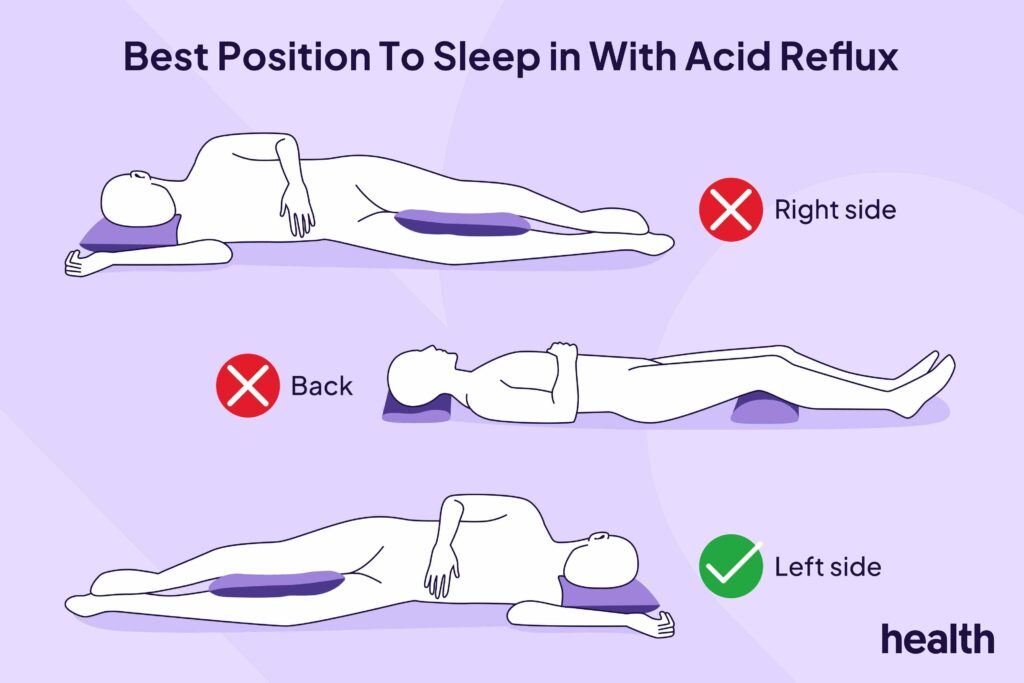People who sleep on their left side tend to experience less heartburn pain and fewer reflux episodes.
Design by Health
The benefit of left-side sleeping comes down to your body’s anatomy.
Because of how your stomach curves, most of your stomach contents sit below your esophagus when you lie on your left side. Gravity helps keep stomach acid below the opening of your esophagus when you sleep in this position, preventing it from flowing backward.
This position also helps with acid clearance. If reflux does happen, sleeping on your left side allows gravity to pull the acid back down into your stomach more quickly than sleeping in other positions.
This is helpful, as the longer stomach acid stays in your esophagus, the more irritation and damage it can cause.
Your sleep position can greatly affect how often acid reflux symptoms occur and how severe they are:
- On your right side: Sleeping on your right side may worsen acid reflux. Lying on your right side positions most of your stomach above your esophagus. In this position, gravity works against you, making it easier for stomach acid to flow into your esophagus.
- On your back: Lying flat on your back can also aggravate reflux. In this position, stomach acid can pool in your esophagus.
- On your stomach: Sleeping on your stomach may put pressure on your abdomen, potentially squeezing it and forcing acid up into your esophagus.
Changing your sleep position is just one way to help avoid acid reflux. Other ways to help manage acid reflux during your sleep may include:
- Elevate your head: Using a wedge pillow or raising the head of your bed can help gravity keep your stomach acid from flowing back into your esophagus.
- Avoid late-night meals: Try to eat your last meal at least two hours before bedtime. This gives your stomach enough time to digest the food and empty itself before you lie down.
- Limit certain foods and beverages: Fatty and fried foods, spicy foods, citrus, tomatoes, and chocolate can make acid reflux more likely. Alcoholic, caffeinated, and carbonated drinks can also increase the chance of reflux. Try to avoid these foods and beverages, especially in the evenings.
- Maintain a healthy weight: Excess weight, particularly around your abdomen (belly), can increase pressure on your stomach and may contribute to acid reflux.
- Quit smoking: Smoking weakens the lower esophageal sphincter (the muscle that keeps acid in your stomach) and increases acid production. Both of these effects can make reflux worse. Quitting tobacco can help improve your symptoms.
You can also consider over-the-counter medications to treat acid reflux symptoms. Medication options include:
- Antacids: These medications can provide quick relief for occasional heartburn by neutralizing stomach acid.
- H2 blockers: These drugs reduce how much acid your stomach produces.
- Proton pump inhibitors (PPIs): These are stronger medications that reduce acid production for longer periods.
Your healthcare provider can advise you on which of these medications may be right for you. If none of the methods above relieve your acid reflux, your provider may recommend surgery or another procedure for GERD.
Lifestyle changes and over-the-counter medications are often effective treatments for acid reflux. But long-term reflux damage to your esophagus can lead to serious complications. Delaying treatment can increase your risk of conditions such as:
- Esophagitis (inflammation of the esophagus)
- Ulcers in your esophagus
- Chronic cough
- Tooth problems
- A precancerous condition called Barrett’s esophagus
Call your healthcare provider right away if you have frequent or severe acid reflux, or if you have:
- Vomiting
- Bleeding
- Trouble swallowing (dysphagia)
- Painful swallowing (odynophagia)
- Unexplained weight loss or loss of appetite
- Feelings of choking or something being stuck in your food pipe
- Chronic hoarseness


